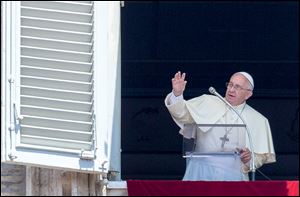
Pope Francis is 1st to order the mob ‘excommunicated’
Professor: Warning also applies to drug dealers in the U.S.
6/25/2014
Pope Francis said last week in southern Italy: ‘Those who follow the path of evil, like the mafiosi do, are not in communion with God; they are excommunicated!’
PITTSBURGH — When Pope Francis declared last week that organized crime figures are “excommunicated” from the Catholic Church, he wasn’t making a formal legal declaration against any individuals.
But by venturing into southern Italy with its historically ambivalent relationship between church and mob — with some priests actively fighting its influence but others lulled by the generosity and public piety of local dons — the Pope was drawing a bold line in saying there can be no compromise with those involved in the “adoration of evil.”
“The term [excommunication] is not meant to be a penalty, but it’s meant to help a person who is involved in some kind of action to know what they’re doing is seriously wrong,” said Pittsburgh Bishop David Zubik.
RELATED ARTICLE: Catholic excommunication is medicinal, not permanent
Mob leaders who conduct a “double life” of piety alongside “horrendous evil” need to cease, he said.
The Pope made his comments while visiting the southern Italian region of Calabria, which is still reeling from the recent killing of a 3-year-old boy in an apparent mob attack on his grandfather.
“When instead of adoring the Lord, one substitutes the adoration of money, one opens the path to sin, personal interests, and exploitation,” Pope Francis said in a homily at an outdoor Mass to the estimated crowd of about 250,000 near the town of Sibari.
“When one does not adore the Lord God, one becomes an adorer of evil, like those who live lives of crime and violence. Your land, which is so beautiful, knows the signs and consequences of this sin. This is what the ’Ndrangheta is: the adoration of evil and contempt for the common good.”
He added: “Those who follow the path of evil, like the mafiosi do, are not in communion with God; they are excommunicated!”
Past popes also have spoken out against organized crime, but Francis is the first to use the word “excommunicated,” according to Vatican watchers. He has previously prayed with victims of mob violence and formally beatified a priest killed in 1993 by the Mafia.
Organized crime takes various forms in Italy — with the so-called Mafia in Sicily, the ’Ndrangheta in Calabria, and the Camorra in Naples — but has common roots in the clans of pre-unification Italy. It is marked by extortion from local businesses and involvement in fields as varied as construction, drugs, human trafficking, and political corruption.
And it has often been entangled with the local Catholic churches.
“It was always good for the Mafia to be seen as religious, as pious, donating to festivals and building chapels or churches or things like that,” said the Rev. Thomas Reese, senior analyst at the National Catholic Reporter and author of books on the Catholic hierarchy.
Nicholas Cafardi — dean emeritus and professor of law at Duquesne University in Pittsburgh, who has represented numerous dioceses, is a canon lawyer and was an original member of the U.S. Bishops’ National Review Board on sexual abuse issues — said it remains common for business owners in southern Italy to be shaken down for protection money by the same mob bosses who would join them at the communion rail on Sundays.
“It was very common in Sicily for Mafia dons to go to church, and I’m sure some of them still do, although it’s going to be more uncomfortable now,” he said.
The Pope’s words may not change the hearts of hardened murderers, “but it might help the people who are trying to take away the power of organized crime,” Mr. Cafardi said in a phone interview from Italy. “There’s a movement of priests and young people to basically drive it out of business, make it a shameful thing to be associated with.”
Some priests have been attacked for such efforts — including one who was beatified last year, two decades after his murder — and Francis is taking some risk in decrying them, he said.
“He said it out in the open. These people carry guns, and they’ve killed priests and bishops.”
In 1993, John Paul II said to those responsible for Mafia-related murders in Sicily: “Convert! One day, the judgment of God will arrive!” Bombings on churches followed, and while no one claimed responsibility, few doubted the connection, according to Witness to Hope, a biography of John Paul II by George Weigel.
Bishop Zubik said he didn’t plan to make a specific pronouncement against any local crime figures or organizations.
Under Catholic canon law, a pope or bishop can issue a specific statement excommunicating someone for a specific act.
But also, someone is considered to have automatically excommunicated his or her self by certain actions. Those include: procuring an abortion, involvement in heresy (false teaching), apostasy (rejecting the faith) or schism (dividing the church), being involved in a forbidden organization, physically attacking the Pope, or violating the confidentiality of the confessional.
While murder isn’t specifically listed, involvement in an organization that operates on murder and theft could well qualify, Mr. Cafardi said.
The Pope’s warning doesn’t just apply to Italy, Mr. Cafardi said.
“We have organized crime in America as much as any other country in the world,” Mr. Cafardi said. “The sale of drugs is a form of murder.”
The Block News Alliance consists of The Blade and the Pittsburgh Post-Gazette. Peter Smith is a reporter for the Post-Gazette.
Contact Peter Smith at: petersmith@post-gazette.com 412 263-1614, or on Twitter @PG_PeterSmith.